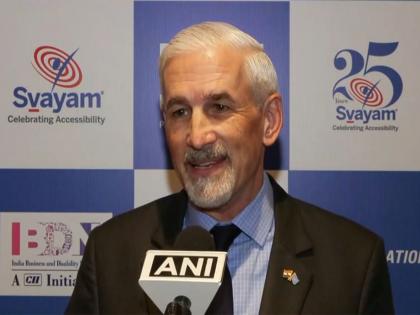"India can become assistive technology hub to world": UN Resident Coordinator Shombi Sharp
By ANI | Updated: November 6, 2025 17:50 IST2025-11-06T17:49:18+5:302025-11-06T17:50:11+5:30
New Delhi [India], November 6 : Shombi Sharp, the United Nations' Resident Coordinator for India, lauded the initiatives taken ...

"India can become assistive technology hub to world": UN Resident Coordinator Shombi Sharp
New Delhi [India], November 6 : Shombi Sharp, the United Nations' Resident Coordinator for India, lauded the initiatives taken by the Indian Government towards promoting a more accessible and inclusive society. He also shared key initiatives spearheaded by the UN to further the cause.
Sharp asserted that India has the potential to emerge as a global hub for assistive technology.
UN envoy made the remarks on the sidelines of the National Summit on Accessibility in New Delhi.
In an exclusive interview with ANI, Shombi Sharp said, "India can become an assistive technology hub and supplier of technology to the world. India has some of the most advanced digital public infrastructure in the world, and is driving disability inclusion through digital public infrastructure and Government Abhiyans."
He highlighted how the United Nations is collaborating with the government to make Indian festivals more inclusive for people with disabilities while sharing an example of how a UNESCO-led program has made Durga Puja more accessible. "We had 40 pilot pandals that are fully disability-inclusive, and hopefully, we'll scale that up to 400. The idea now is to take that to all of the festivals of India".
Calling India a "truly important leader- both as a voice for the global south and a leader in south-south cooperation", Sharp listed some key Indian initiatives which have the potential to benefit the world. "Digital inclusion, digital public infrastructure, and the India stack are important elements to bring inclusion in today's modern digital age."
Sharp said that the Sustainable Development Goals 2030 and Viksit Bharat 2047 are "two stepping stones on the same path to peace and prosperity and disability inclusion is a fundamental cornerstone of both. That's why we're focusing, investing in partnerships around disability inclusion across all aspects of life."
He appreciated the role India is playing in the cause for the rights of persons with disabilities.
"India has one of the most progressive disability rights laws in the world. So we are partnering with India- with government, civil society, business, to help apply that legislative framework and make it a lived reality for the hundreds of millions of people living in India with some form of disability or another," UN Resident coordinator said.
Highlighting the economic potential of inclusivity, he said, "If we achieve disability inclusion, we can add GDP growth of 7% of GDP."
He hailed the National Disability Summit, noting that the Summit came at a poignant time, with the need of the hour being to have these important conversations.
The National Accessibility Summit 2025 took place in the national capital on Thursday, bringing together people from all walks of life who spoke about the need for accessibility and inclusion in India.
Organised by India's leading accessibility organisation, Svayam, founded by industrialist Sminu Jindal, the Managing Director of Jindal SAW, the Summit saw transformative and thought-provoking discussions around the intersection of accessibility with sports, transportation, tourism and the ICT sector.
The Summit echoed Jindal's vision of how "Like humanity, inclusion is universal", and her call for redesigning the world so that it is accessible and everyone is able to contribute to their best potential.
Disclaimer: This post has been auto-published from an agency feed without any modifications to the text and has not been reviewed by an editor
Open in app